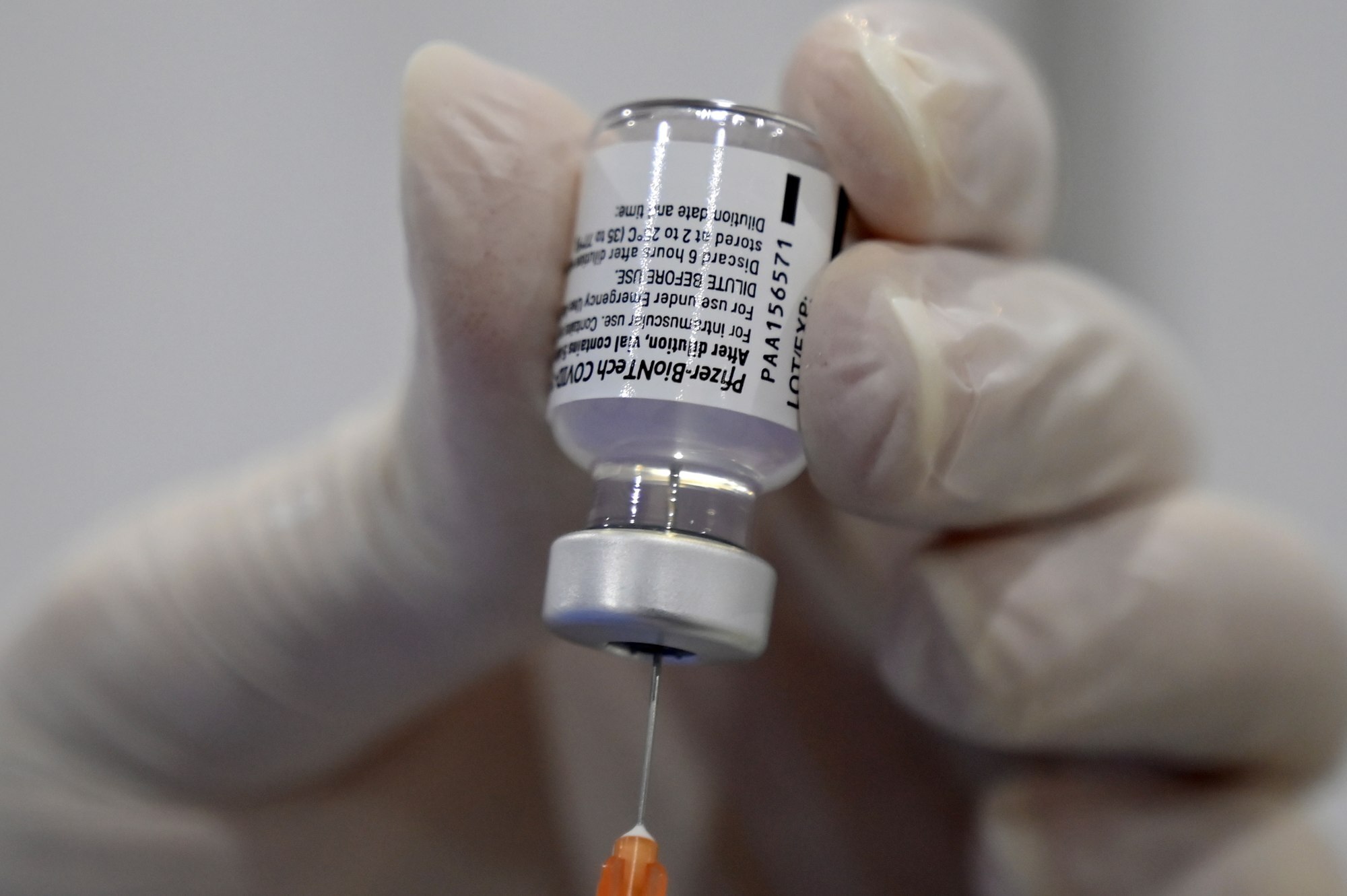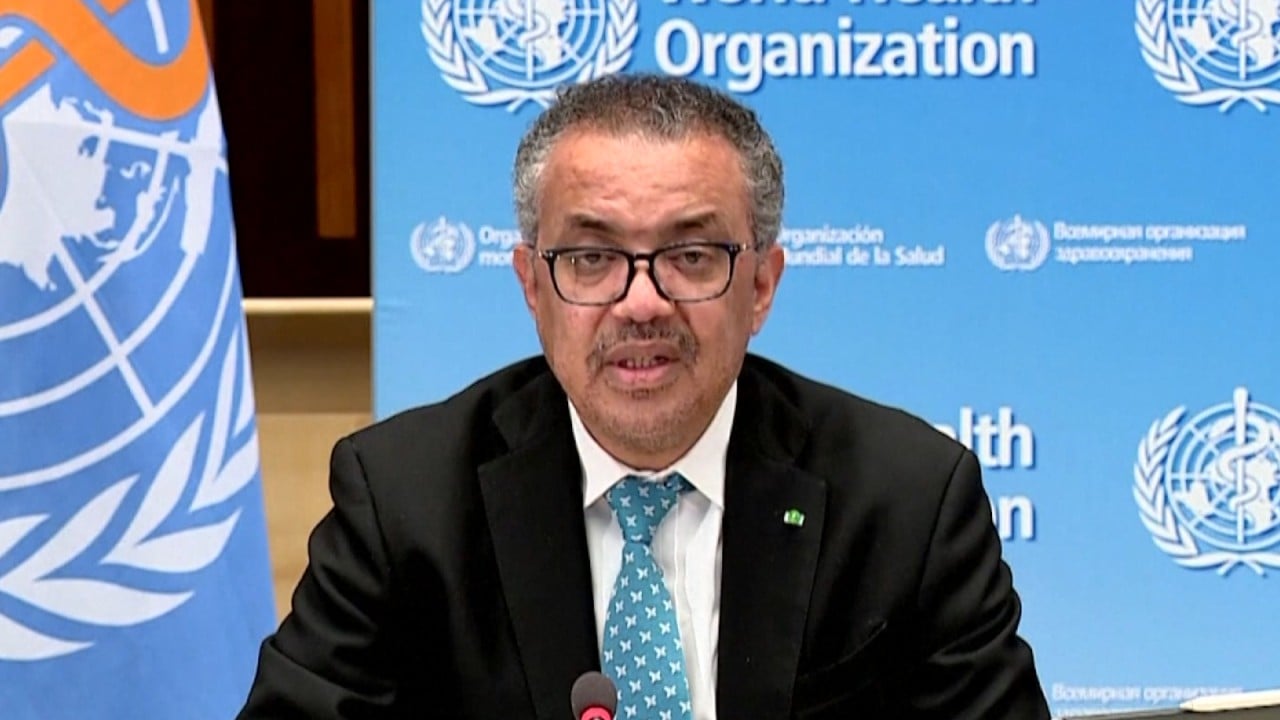
Coronavirus: Hongkongers aren’t rushing for vaccines, and that means herd immunity could be another 300 days away, experts say
- Pre-pandemic normality could be restored when 70 per cent of the population – the expected threshold for herd immunity – is vaccinated
- But there is also a chance social-distancing rules may be further relaxed when 30-50 per cent of the city’s population receives a shot, experts say
Revealing details about the government’s thinking to the Post in an exclusive interview, Secretary for the Civil Service Patrick Nip Tak-kuen said only about 25,000 shots were taken each day in the city, which was equivalent to just half of the capacity available, so there was an urgent need to speed up the vaccination level.
One plan involves reducing the minimum age for vaccination to cover everyone aged above 16, although the timetable remains unclear. The city’s vaccination drive was expanded just last week to include all residents over 30, domestic helpers and students studying overseas, meaning 5.5 million people were now covered.
And in a bid to boost the city’s drive towards achieving herd immunity, Lam also said on Tuesday her administration was open to forging mutual-recognition arrangements with other jurisdictions for visitors who had received two doses of vaccine. Other incentives included exempting jab recipients from certain travel restrictions and relaxing more social-distancing measures.
Pre-pandemic normality could be restored when 70 per cent of the population – the expected threshold for herd immunity – had been vaccinated. While local officials have not set a timetable to achieve such immunity, they hope to get most people vaccinated by the end of the year.
Hong Kong aims to lower coronavirus vaccine age threshold to 16
Professor Ivan Hung Fan-ngai, co-convenor of an expert committee monitoring the side effects of vaccines, said the city could optimistically achieve a 70 per cent vaccination rate by the end of this year at the earliest.
“The response rate is relatively slow currently, but as more young people aged between 30 and 50 take the jabs, the public will have more confidence in the vaccines,” Hung said on Monday. “Travel bubbles in the near future may help to boost the rates as well, as the government has hinted those who take the jab might be exempted from certain travel restrictions.”
Respiratory medicine specialist Dr Leung Chi-chiu believed it would take another 300 days to achieve the goal, as the public would need time to digest and decide on which jab to take.
“We need those who get vaccinated to protect those who have not taken it, to stop transmission. It’s a long process as the spread of the coronavirus could be real quick. Thus, herd immunity could only be reached when most of the population take the doses,” Leung added.
Reluctant public
Government pandemic adviser Professor David Hui Shu-cheong believed the slow rate was partly due to recent deaths, despite no link being established between the fatalities and the jabs, while the relatively stable coronavirus situation did not present any urgency for vaccination.
Seven chronically ill residents died after receiving the Chinese-made Sinovac vaccine and one person, also with underlying conditions, following vaccination with the German-made BioNTech shot, leading to mounting public concerns over potential side effects.
“Unlike European countries, Hong Kong recorded sporadic [virus] cases from time to time only. Most people will wait and see, as they feel no urgency to take the vaccines at this moment,” he said.
Another government adviser, Kenji Fukuda, agreed there were several reasons as to why many people were reluctant to get vaccinated.
“One is that people simply are confused. For example, is the older technology used by Sinovac safer or is newer technology used by BioNTech better? Which will provide a longer period of protection? Which will cover the newer variants better?” he said.
Fukuda, director of the school of public health at the University of Hong Kong, said another reason was that people were nervous about the safety of the vaccines.
“The news coverage in Hong Kong is emphasising deaths following vaccination, creating an impression that is difficult to counter, no matter how much experts explain that no clear links have been found,” he said. “I hope the public trusts this process; I do and am grateful to have had the chance to get my first vaccination.”
Globally, Israel has taken the lead on vaccinations with well over half the country’s 9 million residents having received their first Covid-19 jab in three months, while more than 40 and 36 per cent of the population in Britain and the United States, respectively, have taken jabs since December.
In the US, fully vaccinated people can visit one another indoors without wearing a mask or practising physical distancing, while earlier this month, the European Commission proposed a “digital green certificate” that would allow those who had been vaccinated, received a negative test result, or recovered from Covid-19 to travel freely within EU member states.
British authorities forecast that all social-distancing rules will be lifted before the end of June, while experts are expecting more normality to be restored before summer’s end in the US.
By comparison, the vaccine roll-out is moving at a crawl in some Asian places. Macau, which has mostly recorded zero cases in the past 11 months, achieved only 5.2 per cent in the past 1½ months. Singapore, which recorded 13 cases on average each day in the past week, is doing better comparatively, reaching more than 10 per cent vaccination rate.
Time to relax social-distancing measures?
Hui said the West’s experience proved when the countries had more than 30 per cent of people vaccinated, their Covid-19 infection rates dropped massively. Britain recorded about 5,300 infections on Sunday, a huge drop from more than 60,000 cases per day in January.
“These overseas trends show some social-distancing measures can be lifted once a city has enough of the population carrying antibodies,” he said. “Of course, border control measures cannot be lifted but reopening some establishments or allowing more social activities are possible.”
But he added vaccination was only one control measure, and it was important the city had no major outbreaks before any relaxation.
Dr Lam Ching-choi, an Executive Council member who sits on a task force overseeing vaccine distribution, however, believed a higher percentage of inoculation had to be reached before relaxing measures.
“Unlike other countries, Hong Kong has a target of reaching zero infections, and to achieve this goal, it requires more people to take the vaccines, such as more than half of the population,” he said.
Opinion | Amid vaccine death rumours and blood clot fears, follow the science
Earlier, bosses of some companies were considering incentives for staff to take jabs after their industries were added to the list of priority groups for vaccination in early March, but some admitted there was little interest.
David Leung Chi-wai, chairman of Seafood Delight Group which operates 12 Chinese restaurants with about 400 employees, said he had exempted staff from taking unpaid leave if they received a shot.
“But so far, just dozens of staff took that, as the recent reported deaths worried many people,” he said. “We cannot force our staff to do that if they are not willing.”

Simon Wong Ka-wo, president of the Hong Kong Federation of Restaurants and Related Trades, said he had been communicating with his organisation’s more than 1,000 corporate members, asking them to encourage staff to take the shots, but he estimated only around 10 per cent of industry employees had been vaccinated.
Building confidence
Government advisers Hui and Lam both agreed it was important to boost public confidence on jab-taking before “setting criteria” on increasing vaccinations.
“It’s important to gather more scientific evidence and data, and explain to the public that there’s no link between the fatalities and the jabs,” Lam said. “We have to be transparent and provide details of each death, such as a stroke would not be a symptom after receiving a dose.”
He added: “Only when people start feeling confident, can we talk about incentives, such as those who are willing to take the jab could visit their family members in homes for the elderly.”
First Covid-19 cases may have been infected in October 2019, says new study
Hui also suggested the government could make use of the health authorities’ regular coronavirus briefing to address these issues, while providing details of other typical deaths linked with elderly people.
Fukuda said while the government should continue to solicit and use scientific and clinical guidance, experts and the media needed to be mindful of their influence in shaping public opinion and had to provide accurate context to comments.

The city has struck deals to purchase 22.5 million doses of vaccines, with 7.5 million shots each coming from three suppliers: Sinovac Biotech; British-Swedish firm AstraZeneca; and Fosun Pharma, which is delivering the jab jointly developed by BioNTech and US-based Pfizer. Currently, more than 2.3 million doses of Sinovac and BioNTech vaccines have arrived and are in use in the city.
Earlier, the government estimated AstraZeneca jabs would arrive in the second half of this year but no concrete timetable was given, while local officials said they would monitor possible side effects of the vaccine after reports of blood clots in some recipients.
Two teams of medical researchers in Norway and Germany independently found the vaccine could trigger an autoimmune reaction causing blood to clot in the brain, prompting several European countries to temporarily stop using it.
But the company said on Monday the results of its latest phase-three trial in the United States indicated a 79 per cent efficacy rate and no increased risk of blood clots from among more than 21,000 participants.
Asked whether Asia-specific trials would be conducted as cities such as Hong Kong were planning to use the vaccine, executive vice-president of biopharmaceuticals research Menelas Pangalos said there were no such plans, although previous studies had been conducted in Japan and India.
Additional reporting by Rachel Yeo


